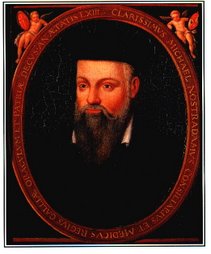Biography
Michel de Nostredame (1503-66), later known as Nostradamus, was one of the leading lights of the late French Renaissance. A Jewish-French contemporary of Paracelsus and England's Dr John Dee, he was (from 1530) at medical college with Rabelais and much admired by the poet Ronsard. As a physician he came to specialise in the Plague, on which he was recognised as one of the foremost experts: in his 'Traité des fardemens', though, (see below) he frankly admits that none of his cures actually had much effect on the disease - not even the bleeding that some commentators insist that he never used. He was also famed as a mathematician and astrologer. On his semi-retirement in around 1550 he turned to writing. Apart from a highly popular cookbook (actually, a 'Treatise on Cosmetics and Conserves') and a number of academic works, his main fields were astrology (with which, as a contemporary doctor, he was of course already fully conversant) and prophecy. This brought him into great public prominence, and he became particularly influential at the French court. He also invested heavily in local public works - notably the irrigation of the vast Plaine de la Crau just to the west of his adopted home-town of Salon-de-Provence, a scheme whose results (like his house in the town) can still be seen today. Twice married, he had two children by his first wife Henriette d'Encausse (all three died) and six by his second.
Subscribe to:
Post Comments (Atom)

1 comment:
Post a Comment